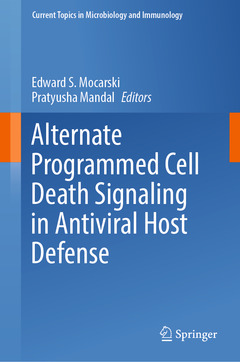Alternate Programmed Cell Death Signaling in Antiviral Host Defense, 1st ed. 2023 Current Topics in Microbiology and Immunology Series, Vol. 442
Coordonnateurs : Mocarski Edward S., Mandal Pratyusha

This volume provides a comprehensive review of programmed cell death pathways and their fundamental role in antiviral host defense. The book deep-dives into the molecular functions and regulation of necroptosis and discusses how viruses induce and manipulate this potent innate cellular sensing system.
Initially, understanding of necroptosis emerged from studies on tumor necrosis factor (TNF) signaling that showed the key role of receptor interacting protein kinase 1 (RIPK1) in the activation of receptor interacting protein kinase 3 (RIPK3) which then phosphorylates mixed lineage kinase domain like pseudokinase (MLKL) to execute cells via plasma membrane leakage of cytosolic contents. Since its discovery, multiple facets of the RIPK3-dependent necroptotic machinery have evolved where the requirements for execution of death varies depending on the stimulus.
Virus-induced necroptosis was discovered over 10 years ago in studies on murine cytomegalovirus (MCMV) where a virus-encoded inhibitor was shown to prevent the recruitment of RIPK3 (RIP3). This transformative evidence identified a novel pathway acting independent of TNF, interferon or RIPK1 that can stop virus from infecting its natural mouse host by killing off infected cells to halt replication. Over the past decade influenza A virus (IAV), herpes simplex virus (HSV) and poxvirus vaccinia (VACV) have all been shown to trigger the pathway. Herpesviruses and poxviruses also encode inhibitors of caspase-8 whose elaboration unleashes the necroptosis pathway. IAV and other RNA viruses do not encode programmed cell death inhibitors. RIPK3 is also known to induce apoptosis by recruiting RIPK1 as shown nearly a decade ago and this dual apoptosis/necroptosis induction occurs naturally during influenza A virus infection. RIPK3 is also able to induce an inflammatory response independently of programmed cell death that can predominate to drive inflammatory disease outcomes.
This volume is a must-read for researchers and advanced students in immunology and virology.
Edward Mocarski, Ph.D. and Pratyusha Mandal, Ph.D. are internationally recognized leaders in programmed cell death with particular emphasis on necroptosis. The full spectrum of necroptosis signaling became clear through their investigation of virus-encoded cell death suppressors. Contributions of cell death signaling to inflammation as well as immunity emerged from their investigations.
Dr. Mandal received a Ph.D. in Virology from Purdue University and completed postdoctoral at Emory University with Dr. Mocarski before joining City University of New York (Lehman College) as an Assistant Professor where her current research interests continue in the areas of acute and chronic infection as well as pathogen-encoded cell death suppressors.
Dr. Mocarski received a Ph.D. in Microbiology from the University of Iowa and completed postdoctoral study at The University of Chicago with Dr. Bernard Roizman before joining the Department of Microbiology and Immunology at Stanford University between 1983 and 2006 and at Emory University as Robert W. Woodruff Professor between 2006 and 2021.Provides a comprehensive perspective on programmed cell death in antiviral immune response
Focuses on cell autonomous cell death pathways in mammals
Sheds new light on additional features of the signaling apparatus
Date de parution : 12-2023
Ouvrage de 174 p.
15.5x23.5 cm
Disponible chez l'éditeur (délai d'approvisionnement : 15 jours).
Prix indicatif 147,69 €
Ajouter au panier


